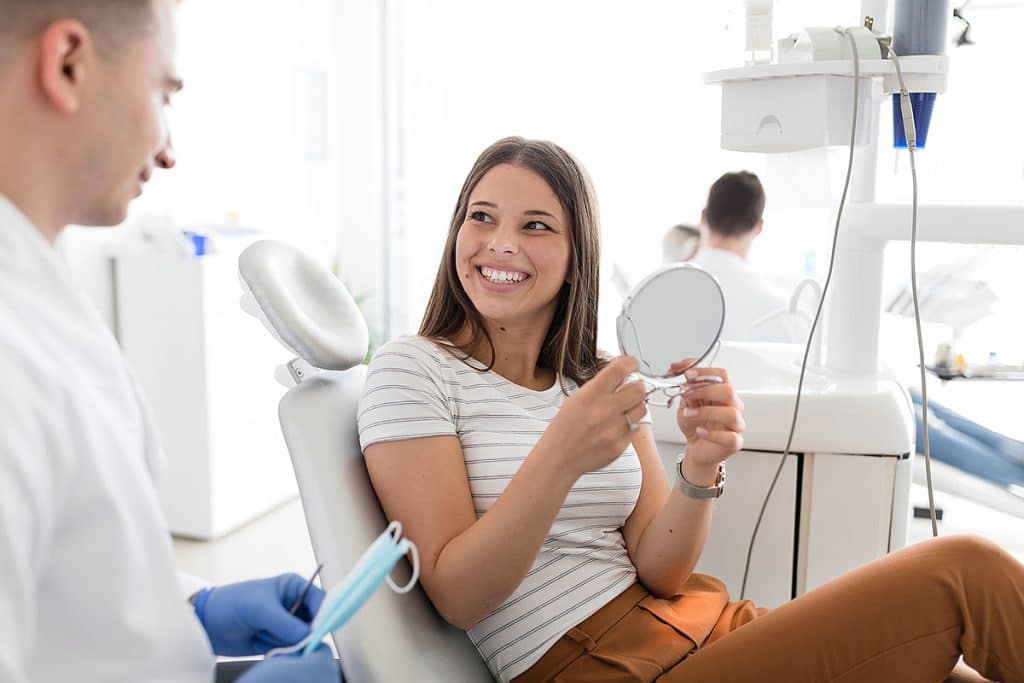How Often Should You Get Your Teeth Cleaned?

Dental experts everywhere recommend brushing twice a day and flossing at least once a day, but sometimes that isn’t enough. Professional cleanings are still just as important as brushing, flossing, and following a healthy diet.
Professional dental cleanings are sometimes the only way to completely remove plaque and tartar build up. Here are some of the most common reasons dental cleanings are important:
Preventing tooth decay: Dental cleanings help to remove plaque and tartar build-up on teeth, which can lead to tooth decay if left untreated.
Preventing gum disease: When plaque and tartar are left on teeth for too long, they can cause inflammation of the gums, leading to gum disease. Regular dental cleanings help to remove the bacteria that cause gum disease and keep your gums healthy.
Maintaining fresh breath: Plaque and tartar buildup can cause bad breath, and regular dental cleanings help to remove these bacteria and keep your breath fresh.
Early detection of oral health problems: During a dental cleaning, your dentist can identify any potential oral health problems, such as cavities, gum disease, or oral cancer, and take appropriate action to address them before they become more serious.
Maintaining overall health: There is a strong link between oral health and overall health. Poor oral health has been linked to a range of health issues, including heart disease, diabetes, and respiratory infections. Regular dental cleanings can help to maintain good oral health and reduce your risk of these health problems.
Process for Dental Cleaning
A dental cleaning is a routine procedure that is performed by a dental hygienist or dentist to remove plaque, tartar, and stains from your teeth. The following are the basic steps involved in a dental cleaning:
- Examination: Before the cleaning, the dental hygienist or dentist will examine your mouth to check for any signs of tooth decay, gum disease, or other oral health problems.
- Scaling: The dental hygienist or dentist will use a scaler to remove plaque and tartar from your teeth. The scaler is a hand-held tool that uses a gentle scraping motion to remove the buildup of plaque and tartar on the teeth.
- Polishing: After the scaling, the dental hygienist or dentist will use a polishing tool and a special toothpaste to polish your teeth. The toothpaste has a gritty texture that helps to remove any remaining plaque or stains on your teeth.
- Flossing: The dental hygienist or dentist will then floss your teeth to remove any debris or plaque that may be stuck between your teeth.
- Fluoride Treatment: At the end of the cleaning, a fluoride treatment may be applied to your teeth to help strengthen your tooth enamel and protect your teeth from cavities.
The entire dental cleaning process usually takes between 30 minutes to an hour, depending on the amount of plaque and tartar buildup on your teeth. It is recommended that you have a dental cleaning at least twice a year to maintain good oral health.
How Often Should You Get a Professional Dental Cleaning?
The American Dental Association (ADA) recommends that individuals should visit their dentist for a dental cleaning and checkup at least once every six months. However, the frequency of dental cleanings may vary depending on an individual's oral health status.
For some people, such as those with a history of gum disease, a weakened immune system, or a high risk of tooth decay, more frequent dental cleanings may be necessary. Your dentist can determine this based on your individual oral health needs.
In addition to regular dental cleanings, it is important to maintain good oral hygiene habits at home, such as brushing twice a day with fluoride toothpaste, flossing daily, and using mouthwash to help prevent plaque buildup and maintain healthy teeth and gums.
Overall, the best way to determine how often you should get your teeth cleaned is to consult with your dentist. They can evaluate your oral health status and recommend a personalized dental cleaning schedule that meets your needs.
Dental Cleaning in Lincoln, NE
At Family and Implant Dentistry in Lincoln, NE, one of our many services includes general dentistry, where we provide preventative treatments, such as routine dental cleaning or treatment for cavities, gum disease, cracked teeth, and much more. Diagnosis and treatment plan development also play a large role in general dentistry.If you’re due – or overdue - for professional dental cleaning, contact us today at 402-486-0825 to schedule an appointment.


